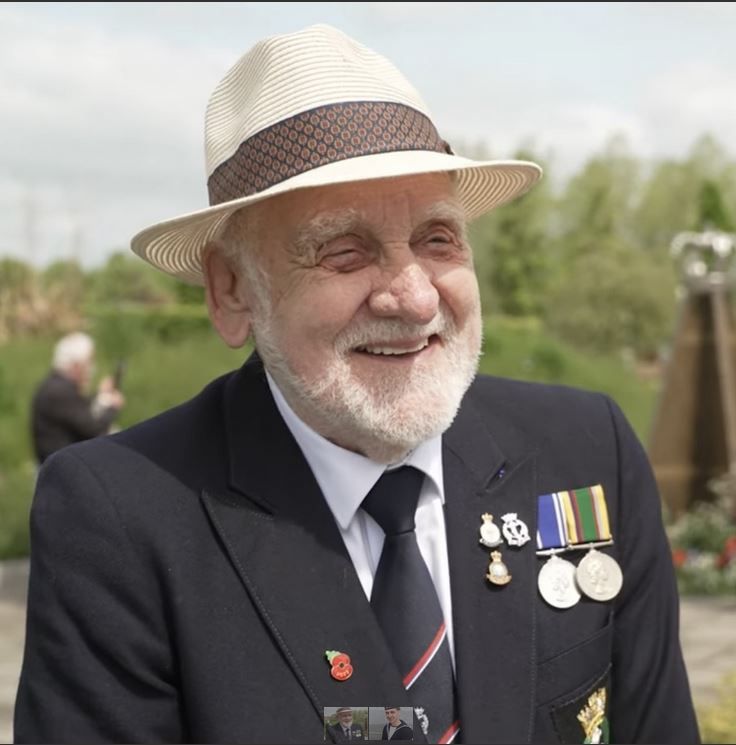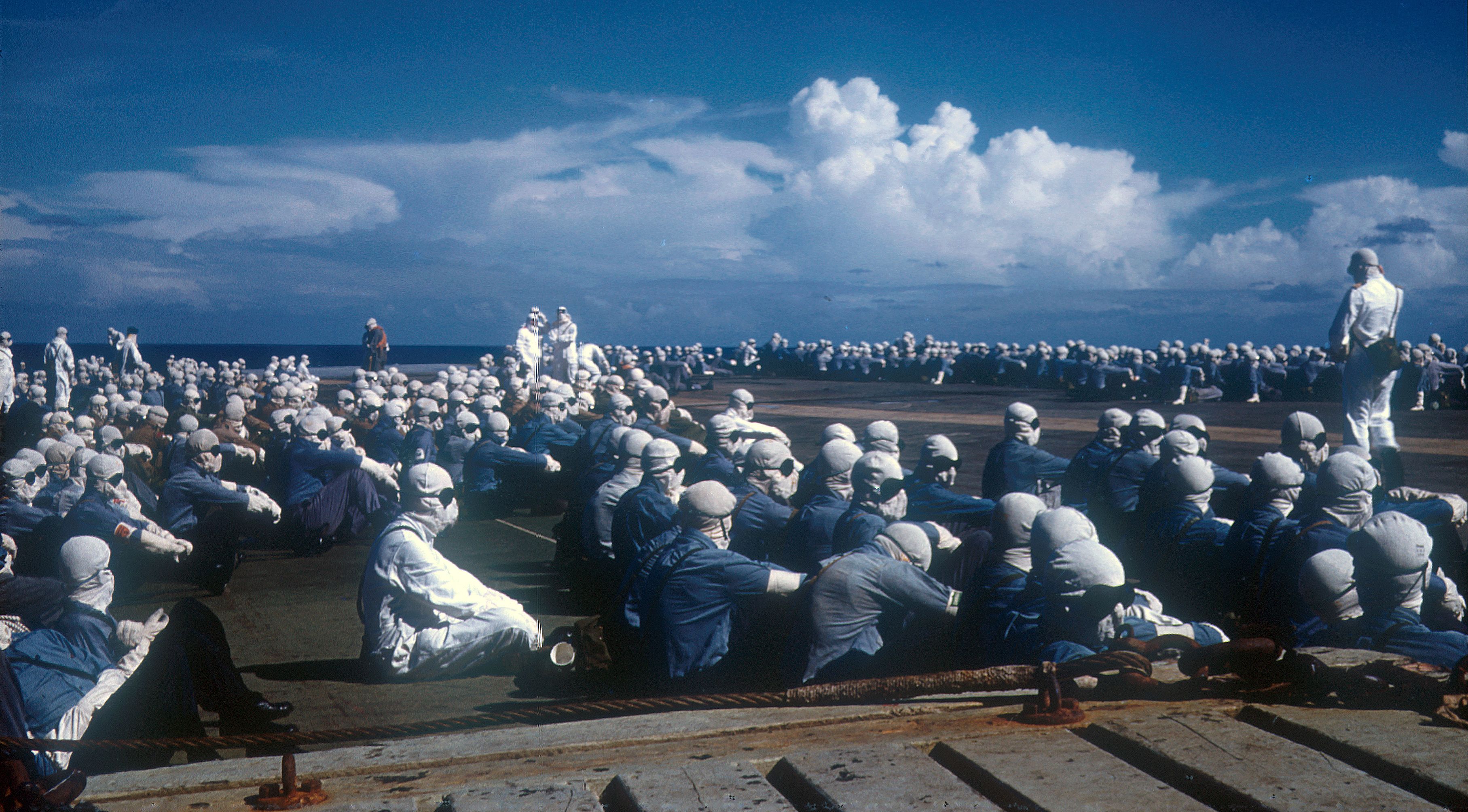
Roger Grace was born in Bedford in 1937. After leaving school at the age of 16 he became a police cadet, before being called up for National Service. He joined the Navy as an ordinary seaman and spent the first part of his service refitting HMS Narvik, the ship which was to be used in Operation Mosaic. In 1956, Grace and his fellow servicemen travelled out to Australia on Narvik for the Operation Mosaic testing series. In Western Australia he spent time assisting with weather balloons and radar. He also worked on the boat crew, ferrying servicemen and scientists between islands. Following his time in the Navy, Grace worked as a police officer for 39 years. He has two daughters, four granddaughters, and two great-grandsons. He currently lives in Saltash, Cornwall.
Interview extracts
Description
Roger Grace recalls being shown a film of the Operation Hurricane test before travelling to participate in Operation Mosaic in Australia. The majority of servicemen who travelled to test sites do not recall being shown instructional films such as this one. Many of them do not remember being told anything about where they were going or why.
Following his service, Grace became a police officer. In his interview he describes a training day about civil defence. After the instructor outlined the emergency protocol that should be followed in the event of a nuclear attack, Grace put his hand up and asked, ‘has anyone here actually seen a nuclear detonation?’ ‘No’, said the instructor, ‘I don’t think anyone has’. ‘Well, I have’, Grace retorted, ‘and the training provided here today would offer no protection or safety’.
This is a short extract from an in-depth interview. Roger Grace was recorded for the Oral History of British Nuclear Test Veterans project in 2024. The interviewer was Joshua A Bushen. This project was run in partnership with National Life Stories and the full interview can be accessed at the British Library.
Transcript
Well, we were told, when I was first drafted to the ship to go to Australia, they didn’t tell us why, must have been November time, they took the whole ship’s crew into the cinema in Chatham and showed us a film of HMS Hurricane, and said, well that’s what you’re going to be doing. Okay, yeah, fair enough. [laughs]
So they showed you, so they sat you down, they actually showed you footage of the bomb, did they, from Hurricane?
Yeah. That’s what they showed us and said, well, that’s what you’re going to be doing, away you go, back on the ship. We left, we left Chatham, I think we did sea trials towards the end of November, beginning of December, we went down to Marchwood, which is the Royal Engineers depot at Southampton, and loaded up all the mechanics that we had to take, and the bomb. We did start off doing a little bit of the loading, but we weren’t efficient enough for the Royal Engineers and they loaded it, and we sailed on December – we had Christmas leave – and then sailed on December 29th.
[ends at 0:01:05]
Description
Roger Grace, who served as an ordinary seaman during Operation Mosaic, recalls a nuclear test veteran reunion held at the Adelphi Hotel in Liverpool in the mid-1990s. Grace describes making friends with two other test veterans, both of whom had served on Christmas Island. One of the men invited Grace to go on a tour around Liverpool, where he had grown up during the Second World War.
At reunion events, test veterans are often treated to traditional dancing by the UK’s I-Kiribati diaspora community. The small community of I-Kiribati on Christmas Island often performed such dances on special occasions for British officials and visitors, as shown in the photograph that illustrates this clip.
This is a short extract from an in-depth interview. Roger Grace was recorded for the Oral History of British Nuclear Test Veterans project in 2024. The interviewer was Joshua Bushen. The project was run in partnership with National Life Stories and the full interview can be accessed at the British Library.
Transcript
The first reunion I went to was at Liverpool at the Adelphi Hotel. That would have been 90s, mid-90s, I would think, because I had to go up by train because I couldn’t drive at the time, I’d got some problem with my eye. I went there, got in the room and went down and had a look, see what was about, and there was one room where round tables, all the guys there with pint pots and beer bottles on the tables. I thought, that’s not for me. So I went into the ballroom and there was one or two little tables scattered around, and there were two guys sitting at a table with a, I think they’d got a G&T each. I said, ‘Are you with the… ?’ ‘Yeah.’ Said, ‘Can I join you?’ ‘Yeah.’ And that was very strange actually, because although it’s a nuclear test reunion, we didn’t do much, us three didn’t do much about nuclear tests. [laughs] Both of them had been at Christmas Island, one guy was, I think he was fairly high up in the army, because he was involved in the clear-up of Christmas Island, and the other one, I think he was either RAF or army, but he’d been involved in the tests. But the strange thing was, that guy was an ex-policeman, he was an ex-traffic policeman from the next county, Buckinghamshire, and I’d actually probably met him, because I mentioned something and he said, yes, I was involved in that as well. So, we’d probably met. But the other guy, I said the ex-army, I think he was probably captain or major, something like that, he said, well, I’m not really interested in what’s going on with the reunion tomorrow, he said, I was evacuated up here, he said, I wanted to go round and have a look at the places that I went, I went to school up here. So he said, I’m going to get a taxi, do you want to come with me? So I said, well yeah, because I’m not into… So we hired this taxi between us and we went all over the place.
[ends at 0:02:05]


